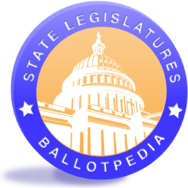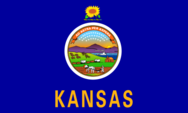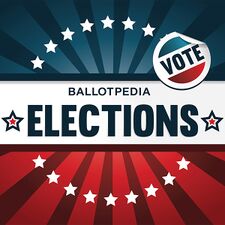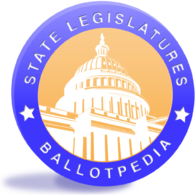Help us improve in just 2 minutes—share your thoughts in our reader survey.
2018 Kansas legislative session
 |
| 2018 legislative sessions coverage |
|---|
| Kansas State Legislature | |
 | |
| General information | |
| Type: | State legislature |
| Term limits: | None |
| Session start: | January 8, 2018 |
| Session end: | April 7, 2018 |
| Website: | Official Legislature Page |
| Leadership | |
| Senate President: | Susan Wagle (R) |
| House Speaker: | Ron Ryckman (R) |
| Majority Leader: | Senate: Jim Denning (R) House: Don Hineman (R) |
| Minority Leader: | Senate: Anthony Hensley (D) House: Jim Ward (D) |
| Structure | |
| Members: | 40 (Senate), 125 (House) |
| Length of term: | 4 years (Senate), 2 years (House) |
| Authority: | Art 2, Kansas Constitution |
| Salary: | $88.66/day + per diem |
| Elections | |
| Redistricting: | Kansas Legislature has control |
During 2018, Ballotpedia tracked notable stories from the Kansas State Legislature. The timeline on this page shows the major events that we tracked during 2018, including events in the regular session and in any special sessions that occurred after the regular session adjourned.
If you know of any additional events that should be added to this page, please email us at editor@ballotpedia.org.
Overview
In 2018, the Kansas State Legislature was in session from January 8, 2018, through April 7, 2018. The legislature was in veto session until May 4, 2018.[1]
Partisan control
Kansas was one of 26 Republican state government trifectas in 2018. A state government trifecta occurs when one political party holds the governor's office, a majority in the state Senate, and a majority in the state House. For more information about state government trifectas, click here.
The following tables show the partisan breakdown of the Kansas State Legislature in the 2018 legislative session.
Senate
| Party | As of July 2018 | |
|---|---|---|
| Democratic Party | 9 | |
| Republican Party | 31 | |
| Vacancies | 0 | |
| Total | 40 | |
House
| Party | As of July 2018 | |
|---|---|---|
| Democratic Party | 40 | |
| Republican Party | 85 | |
| Vacancies | 0 | |
| Total | 125 | |
Leadership in 2018
Senate
- Senate president: Susan Wagle (R)
- Majority leader: Jim Denning (R)
- Minority leader: Anthony Hensley (D)
- Vice president of the Senate: Jeff Longbine (R)
- Assistant majority leader: Vicki Schmidt (R)
- Majority whip: Elaine Bowers (R)
- Assistant minority leader: Laura Kelly (D)
- Minority whip: Oletha Faust-Goudeau (D)
- Minority caucus chair: Tom Hawk (D)
House
- House speaker: Ron Ryckman (R)
- Speaker Pro Tempore: Scott Schwab (R)
- Majority leader: Don Hineman (R)
- Minority leader: Jim Ward (D)
- Assistant majority leader: Tom Phillips (R)
- Majority whip: Kent Thompson (R)
- Majority caucus chair: Susan Concannon (R)
- Assistant minority leader: Stan Frownfelter (D)
- Minority whip: Ed Trimmer (D)
- Minority caucus chair: Barbara Ballard (D)
Regular session
Bill statistics
| Introduced | Passed both chambers | Governor signed | Governor vetoed | |
|---|---|---|---|---|
| House bills | 365 | 70 | 66 | 0 |
| Senate bills | 208 | 54 | 52 | 0 |
| Total | 573 | 124 | 118 | 0 |
Status of legislation at the end of the regular session
This table details the status of legislation covered on this page at the end of the regular session.
| Status of legislation at the end of the 2018 regular session | |||
|---|---|---|---|
| Legislation | Subject area | Actions during the regular session | Status at the end of the regular session |
| HB 2042 | Concealed carry license permits | Passed House Passed Senate |
Died in conference |
| SB 423 | K-12 education funding | Passed legislature | Governor signed |
| SB 61 | Fix to K-12 funding bill | Passed legislature | Governor signed |
February 2, 2018
Kansas House approves bill requiring permit to carry firearms on college campuses
The Kansas House of Representatives approved House Bill 2042 in a 76 to 44 vote. The bill would recognize out-of-state concealed carry licenses for handguns, lower the concealed carry age from 21 to 18, and require a permit to carry concealed firearms on a university campus.[2] The bill was introduced at the request of the Office of the Attorney General.[3] It was sent to the Senate for consideration.
- Update: The Kansas State Senate approved the legislation with amendments on March 15, 2018. The bill died in conference committee.
April 7, 2018
Lawmakers pass $534 million education funding increase
The Kansas State Legislature passed a measure increasing K-12 funding by $534 million over a five-year period. The Kansas State Senate, which originally wanted to increase funding by $274 million, agreed to the measure by a 21 to 19 vote while teachers assembled at the state capitol to show their support.[4] Republican Gov. Jeff Colyer also expressed support for the bill.[4]
The Kansas Supreme Court ruled in October that the state did not sufficiently fund education. With this legislation, lawmakers attempted to address the court's order to provide more education funding or face school shutdowns until more funding can be provided. At the time of the bill's passage, Kansas spent more than $4 billion per year on K-12 education.[4][5]
According to the Kansas State Department of Education, the plan contained an $80 million error in the first year, decreasing the amount of new school funding from $150 million to $72 million. A spokesman for Gov. Jeff Colyer (R) said the governor would still sign the bill and would "work with the Legislature to correct the error when they return."[6] Read more here.
- Update: The governor signed the legislation on April 17, 2018.
- See also: Gannon v. Kansas
April 17, 2018
Gov. Colyer signs education funding bill SB 423 into law
Gov. Jeff Colyer signed Senate Bill 423 into law. The bill passed the state House 63-56 and the state Senate 21-19 on April 7, 2018. The legislature approved SB 423 in response to the Kansas Supreme Court's ruling in Gannon v. Kansas that state education funding was neither adequate nor equitable.
Among its provisions, the bill appropriated:
- $26 million for state foundation aid payments, in addition to already-approved funding.
- $32.4 million for special education services aid, in addition to already-approved funding.
- $6 million for supplemental state aid payments, in addition to already-approved funding.
- $2.8 million for the ACT and ACT WorkKeys assessments. The ACT WorkKeys assessments allow students in grades 9-12 to earn a national career readiness certificate.
- $500,000 for the mentor teacher program for the 2018-2019 school year.
- $10 million for a Mental Health Intervention Team pilot program between school districts and mental health professionals—$7.5 million for program operation and $2.5 million for a one-time purchase of a database.[7]
- See also: Gannon v. Kansas
Veto session, April 26 to May 4
April 30, 2018
Legislators approve fix to school funding bill
The Kansas State Legislature approved a bill to correct an $80 million error in a funding bill they passed on April 7. The fix passed on April 30 would ensure a $534 million education funding increase, as originally intended, and was sent to Gov. Jeff Colyer (R) who expressed support for the measure: "I appreciate the Legislature for working to quickly pass this important school finance bill. Getting funding to the classroom, requiring outcomes for schools, and doing so without a tax increase is a model to move education forward."[8] Read more here.
- Update: Gov. Jeff Colyer (R) signed the legislation on May 7, 2018.
- See also: Gannon v. Kansas
May 7, 2018
Governor signs fix to school funding bill
Gov. Jeff Colyer (R) signed SB 61, legislation to correct an error in SB 423, which the governor signed on April 17, 2018. SB 61 increased the state's base aid for the 2018-2019 school year from $4,128 to $4,165 and enacted gradual base aid increases in each school year from 2019-2020 to 2022-2023. The bill mandated that after 2023-2024, base aid would increase by a three-year rolling average based on the U.S. Bureau of Labor Statistics' consumer price index for all urban consumers in the Midwest region. It also required school districts to have a local budget that amounted to at least 15 percent of the funds received from the state.[9]
- See also: Gannon v. Kansas
Noteworthy events
Kansas Supreme Court rules state's education funding equitable but inadequate
On June 25, 2018, the Kansas Supreme Court ruled that the state's legislative adjustments to education funding, SB 423 and SB 61, were equitable but inadequate. The court concluded that Kansas had not met the adequacy requirement in Article 6 of the state constitution. The court advised the state to undertake further adjustments to inflation and allowed the legislation (SB 19, SB 423, and SB 61) to temporarily remain in effect, thus providing funding for Kansas schools for the 2018-2019 school year. The court extended the deadline for the state to fulfill its constitutional duties to June 30, 2019.[9]
The ruling was the high court's sixth decision in a case called Gannon v. Kansas. The plaintiffs argued that the education funding the state had provided was constitutionally inadequate. In 2013, a three-judge panel agreed, and in 2014 the case reached the Kansas Supreme Court for the first time. Several rounds of court decisions and legislative efforts followed as the parties and court grappled with the requirements of the state constitution and the state budget.
On October 2, 2017, the Kansas Supreme Court ruled that the state legislature had not met its constitutional obligation to adequately and equitably fund Kansas public schools. The court ruled the state had failed to show that the legislature's education funding bill, SB 19, satisfied its constitutional obligation to adequately and equitably fund public education. However, allowing the ruling to go into immediate effect would have invalidated SB 19 and left Kansas schools without funding for the 2017-2018 school year. Therefore, the court stayed its ruling until June 30, 2018, leaving SB 19 temporarily in place. The court ordered the legislature to craft a new funding system and demonstrate to the court that the new system fulfilled the legislature's constitutional duties to adequately and equitably fund public education by June 30, 2018.[10]
Click here for more information.
Legislatively referred constitutional amendments
In every state but Delaware, voter approval is required to enact a constitutional amendment. In each state, the legislature has a process for referring constitutional amendments before voters. In 18 states, initiated constitutional amendments can be put on the ballot through a signature petition drive. There are also many other types of statewide measures.
The methods by which the Kansas Constitution can be amended:
| Kansas Constitution |
|---|

|
| Articles |
| Ordinance • Preamble • Bill of Rights 1 • 2 • 3 • 4 • 5 • 6 • 7 • 8 • 9 • 10 • 11 • 12 • 13 • 14 • 15 |
Article 14 of the Kansas Constitution governs the ways in which the state's constitution can be changed over time.
- One path is the legislatively referred constitutional amendment. Either house of the Kansas State Legislature can propose an amendment to the state's constitution. Two-thirds of the members of each chamber must approve the resolution. If they do, the proposed amendment goes on either the next statewide ballot during which members of the state legislature are elected or on a special election ballot if the legislature agrees to have a special election for this purpose.
- If a simple majority of the electors of the state who vote on the proposition agree with it, it becomes part of the constitution.
- The legislature must say what the measure's ballot title will be in their resolution authorizing it.
- If there is more than one proposed amendment, voters must be able to vote on them separately.
- At most, five amendments can be proposed for one election.
- An amendment is allowed to revise one entire article of the constitution "except the article on general provisions."
- Another path to amend the state constitution is through a constitutional convention. If two-thirds of the members of each house of the state legislature vote in favor, the question "Shall there be a convention to amend or revise the constitution of the state of Kansas?" or "Shall there be a convention limited to revision of article(s) ________ of the constitution of the state of Kansas?" shall be placed on a statewide ballot.
- If a simple majority of those voting on that question say "yes," a convention is held.
- Any amendments or revisions that come out of the convention must go before the state's voters.
Kansas does not feature the power of citizen initiative for either initiated constitutional amendments or initiated state statutes.
See also
| Elections | Kansas State Government | State Legislatures | State Politics |
|---|---|---|---|
 |
 |
 |
 |
External links
Footnotes
- ↑ KSNT News, "Kansas lawmakers to return to statehouse," April 25, 2018
- ↑ The Mercury, "Kansas House passes bill requiring permit to carry guns on college campuses," February 2, 2018
- ↑ Kansas Legislature, "Supplemental note on House Bill No. 2042," accessed February 27, 2018
- ↑ 4.0 4.1 4.2 Miami Herald, "The Latest: Kansas lawmakers pass $534M school funding plan," April 8, 2018
- ↑ Fox 4 News, "Kansas Supreme Court rules the state is not spending enough money on education," October 3, 2017
- ↑ The Wichita Eagle, "$80 million first-year error found in school funding plan passed by Kansas lawmakers," April 9, 2018
- ↑ Kansas Association of School Boards, "KASB Summary of 2018 Legislative Session," May 7, 2018
- ↑ U.S. News & World Report, "Kansas Lawmakers Pass School Aid Fix, Advance Other Spending," April 30, 2018
- ↑ 9.0 9.1 Kansas Supreme Court, Gannon v. Kansas, June 25, 2018
- ↑ Kansas Supreme Court, Gannon v. Kansas, October 2, 2017
